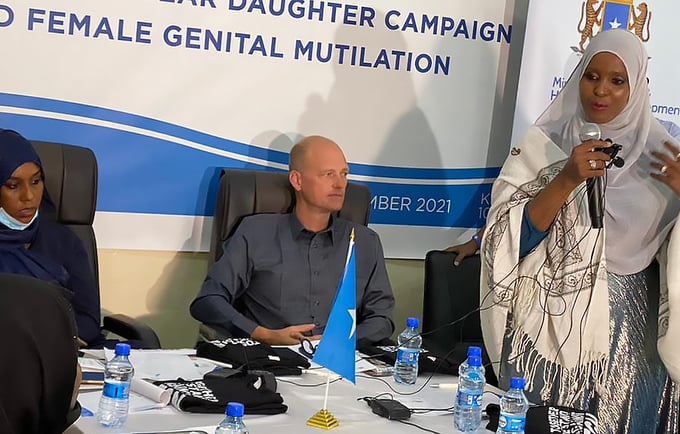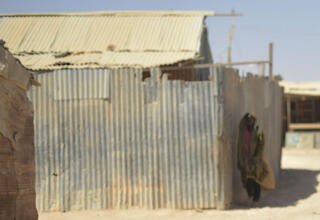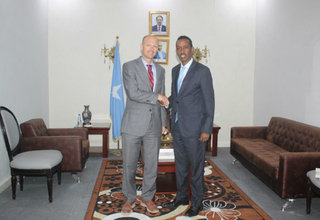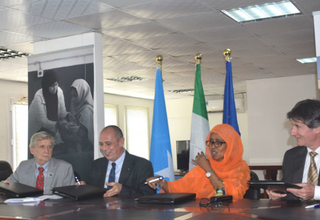Ifrah Ahmed, a Somali-Irish social activist and a survivor of female genital mutilation (FGM), is at the forefront, pushing a radically different approach in a national campaign to end FGM in Somalia. Launched on 30 September 2021 in Mogadishu, with the Ministry for Women and Human Rights Development and UNFPA Somalia, Ifrah Foundation's 'Dear Daughter Campaign' is based on empowering each citizen to pledge to protect their daughter.
Faced with living her entire life with the harrowing consequences of FGM, since she was cut as a girl, Ahmed, founder of the Ifrah Foundation, turned this negative experience into a drive to change the future for others. The Dear Daughter Campaign came about to respond to Ahmed's desire to break the cycle of FGM for future generations of girls and women.
The activist says her resolve to fight more against the harmful practice grew even stronger recently after she gave birth to a baby girl. "Let's not allow our daughters to suffer the pain we've been through, she says." Through her work embedded in the community, Ahmed educates and empowers individuals to pledge to the daughters of Somalia, promising them a future free of FGM.
Ahmed explains that she understands the impact of FGM and works to bring her fellow Somali people with her on the journey to transform the future for the girls of Somalia.
Through the campaign, in seeking individual commitments from stakeholders, such as religious and political leaders, she empowers every parent and guardian to participate in a national pledge to the daughters of Somalia, promising them a future free of FGM.
In partnership with the UNFPA in Somalia, Ifrah Foundation, the development of this campaign has been built on research and experience that subscribes to the three-pillar policy of addressing Female Genital Mutilation. All advocacy, awareness-raising and community engagement and empowerment programs must be undertaken simultaneously and consistently over some time. For example, engaging with religious leaders in the community requires media intervention to spread the message that Female Genital Mutilations is not a religious obligation. Ifrah Foundation recognizes that men also play a key role in perpetuating the practice, which is why it undertakes programs to develop a strong and independent Somali Men and Boys Network to End FGM.
UNFPA Representative for Somalia, Anders Thomsen, understands the value of working in collaboration with local civil society organizations such as the Ifrah Foundation and the power of engaging with communities and individuals on the issue. Further, raising awareness not only on the harms of the practice but also on the work being done to end it will contribute to the elimination of the practice.
"It is symbolic that we are launching the Dear Daughter Campaign in Mogadishu in the call centre for women aspiring for leadership positions to achieve the 30 percent quota for women's representation. We're here to improve the lives of women and girls in Somalia. The urgency and role of women in society must be enhanced on all fronts. Putting an end to FGM is a fundamental pillar of that agenda," says Thomsen.
He explains that FGM is a practice that causes unimaginable suffering in Somalia. "The Dear Daughter Campaign is a gamechanger as it gives a voice for the grassroots to come together for change. This means girls will finally be safe from the brutal cut that undermines the health of women and girls. Together let us transform the pain of FGM into global solidarity," said Thomsen.
The Ministry for Women and Human Rights Development recognizes the need for the Government of Somalia to pass the zero tolerance for FGM legislation and the Sexual Offences Bill to act expeditiously to end the practice and protect the rights of young women and girls in Somalia.
"Equitable access to education, healthcare and employment opportunities accelerate the elimination of FGM," said Minister for Women and Human Rights Development.
The genesis of the Dear Daughter Campaign emerged from extensive research and through recognizing a complex and comprehensive range of thoughts, facts and feelings involved in changing the practice: understanding medical and health consequences; societal, cultural and spiritual factors impeding systemic belief change, rather than behavioural change and human rights empowerment.
While a great deal of research and investigation into understanding the culture and practice of Female Genital Mutilation has been undertaken and much effort afforded to reduce its prevalence in Somalia, the harsh reality evidenced in the 2020 Somalia Health and Demographic Survey (SHDS) is that the needle has not shifted in terms of protecting young women and girls. Somalia has one of the highest rates of FGM in the world. The SHDS indicates that 99 percent of women between the ages of 15 and 49 have been subjected to this extremely harmful and unacceptable practice.
This Dear Daughter envisages an ambitious and highly impactful national wide campaign.
---Pilirani Semu-Banda




